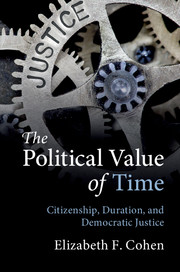Book contents
- The Political Value of Time
- The Political Value of Time
- Copyright page
- Dedication
- Contents
- Acknowledgements
- 1 Introduction
- 2 The Sovereign Temporal Borders around Nation-States, Populations, and Citizenries
- 3 Democracy, Duration, and Lived Consent
- 4 Time’s Political Value
- 5 The Political Economy of Time
- 6 Conclusion
- Bibliography
- Index
3 - Democracy, Duration, and Lived Consent
Published online by Cambridge University Press: 13 February 2018
- The Political Value of Time
- The Political Value of Time
- Copyright page
- Dedication
- Contents
- Acknowledgements
- 1 Introduction
- 2 The Sovereign Temporal Borders around Nation-States, Populations, and Citizenries
- 3 Democracy, Duration, and Lived Consent
- 4 Time’s Political Value
- 5 The Political Economy of Time
- 6 Conclusion
- Bibliography
- Index
Summary
- Type
- Chapter
- Information
- The Political Value of TimeCitizenship, Duration, and Democratic Justice, pp. 62 - 96Publisher: Cambridge University PressPrint publication year: 2018



